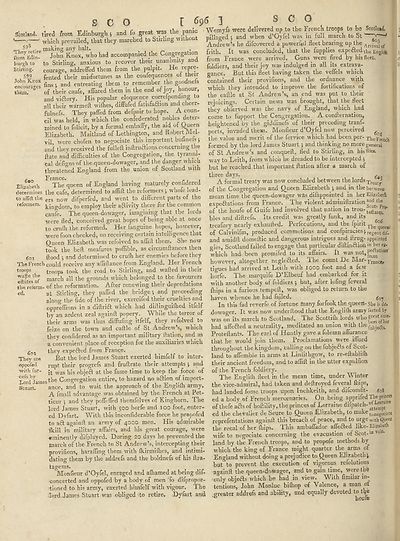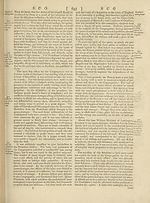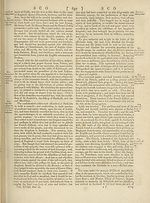Encyclopaedia Britannica, or, a Dictionary of arts, sciences, and miscellaneous literature : enlarged and improved. Illustrated with nearly six hundred engravings > Volume 18, RHI-SCR
(734) Page 696
Download files
Complete book:
Individual page:
Thumbnail gallery: Grid view | List view

SCO t
5call#nd. tired from Edinburgh s and fo great was the panic
' which prevailed, that they marched to Stirling without
rm ^9S making any halt.
Lm Edin John Knox, who had accompanied the Congregation
to Stirling, anxious to recover their unanimity and
courage, addreffed them from the pulpit. He repre-
fented their misfortunes as the confequences cl then
SCO
burgh to
Stirling
599
encourages j and entreating them to remember the goodnefs
encourages ? tl.c, b, end nf mv. honour.
them.
€to
Elizabeth
of their caufe, allured them in the end of joy, honour,
and viftory. His popular eloquence correfponding to
all their warmeft wifhes, diffufed fatisfa£lion and cheer-
fulnefs. They paffed from defpair to hope. A coun¬
cil was held, in which the confederated nobles deter¬
mined to folieit, by a formal embalfy, the aid of Q^ueen
Elizabeth. Maitland of Lethington, and Robert Mel-
vil, were chofen to negociate this important bulinefs j
and they received the fulleft inftrualons concerning the
Rate and difficulties of the Congregation, the tyranni¬
cal defigns of the queen-dowager, and the danger which
threatened England from the union of Scotland with
Y rance.
The queen of England having maturely confidered
iUtzatjetn —e.—” - , 0 - 1 r 1 j
deteriuines the cafe, determined to affift the reformers ■, whole leae -
to affift the ers now difperfed, and went to different parts of the
reformers. , • , . 1 ntnrirrinn
kingdom, to employ their a&ivlty there for the comffion
caufe. The queen-dowager, imagining that the lords
were fled, conceived great hopes of being able at once
to cruffi the reformed. Her fanguine hopes, however,
were foon checked, on receiving certain intelligence that
Oueen Elizabeth was refolved to affilt them. She now
uTok the beft meafures poffible, as circumftances then
6ot flood j and determined to crufli her enemies before they
The French could receive any affiftance from England. Her French
troops troops took the road to Stirling, and wafted in their
T’testf march all the grounds which belonged to the favourers
the reform- of the reformation. After renewing their depredations
695 ]
Wemyfs were delivered up to the French troops to be Scotland,
pillaged ; and when d’Oyfel was in full march to St
Andrew’s he difeovered a powerful fleet bearing up the Arriv°a3lof
frith. It was concluded, that the fupplies expeftedthe Engiigi
from France were arrived. Guns were fired by his fleer,
foldiers, and their joy was indulged in all its extrava¬
gance. But this fleet having taken the veffels which
contained their provifions, and the ordnance with
which they intended to improve the fortifications of
the caftle at St Andrew’s, an end was put to their
rejoicings. Certain news was brought, that the fleet
they obferved was the navy of England, which had
come to fupport the Congregation. A confternation,
heightened by the giddinefs of their preceding trans¬
ports, invaded them. Monfieur d’Oyfel now perceived ,
the value and merit of the fervice which had been Per'The French
formed by the lord James Stuart; and thinking no more general
of St Andrew^ and conqueft, fled to Stirling, in his flies,
way to Leith, from which he dreaded to be intercepted $
but he reached that important ftation after a march of
three days.
A formal treaty was now concluded between the HMs Treat/
of the Congregation and Qyteen Elizabeth j and in the between
mean time the queen-dowager was difappointed in her Elizabeth
expectations from France. The violent adminiftration
of the houfe of Guife had involved that nation in trou-
bles and diftrefs. Its credit was greatly funk, and its
cd
Sot
They are
oppofed
■with fuc-
cefs by
treafury nearly exhaufted. Perfections,^ and the fpirit rhtf^eeil.
at Stirling, they paffed the bridge *, and proceeding
along the fide of the river, exercifed their cruelties and
oppreffions in a diftrift which had diflinguiffied itfelf
by an ardent zeal againft popery. While the terror of
their arms was thus diffufing itfelf, they refolved to
feize on the town and caftle of St Andrew’s, which
they confidered as an important military ftation, and as
a convenient place of reception for the auxiliaries which
they expefted from France.
But the lord James Stuart exerted himfelf to inter¬
rupt their progrefs and fruftrate their attempts ; and
it was his object at the fame time to keep the force of
Tamp, the Congregation entire, to hazard no aeftion of import-
Stuart. ance, and to wait the approach of the Englifti army.
A fmall advantage was obtained by the French at Pet-
ticur ; and they poffeflfed themfelves of Kinghorn. The
lord James Stuart, with 500 horfe and too foot, enter¬
ed Dvfart. With this inconfiderable force he propofed
to aft againft an army of 4000 men. His admirable
ikill in military affairs, and his great courage, were
eminently difplayed. During 20 days he prevented the
inarch of the French to St Andrew’s, intercepting their
provifions, haraffing them with fkirmiffies, and intimi¬
dating them by the addreff and the boldnefs of his ftra-
tagems.
Monfieur d’Oyfel, enraged and aflhamed at being dif-
concerted and oppofed by a body of men To difpropor-
tioned to his army, exerted himfelf with vigour. The
lord James Stuart was obliged to retire. Dyfart and
... J ~ — - . ' r • - me qu
of Calvinifm, produced commotions and conipiracies j regentdif>
and amidft domeftic and dangerous intrigues and ftrug- appointed
gies, Scotland failed to engage that particular diftin&ion her ei-
which had been promifed to its affairs. It was not,
however, altogether neglefted. The count De Mar- prance/
tigues had arrived at Leith with 1000 foot and a few
horfe. The marquife D’Elbeuf had embarked for it
with another body of foldiers ; but, after lofing feveral
{hips in a furious tempeft, was obliged to return to the
haven whence he had failed.
In this fad reverfe of fortune many forfook the queen-she is de,
dowager. It was now underftoud that the Engliffi army ferted by
was on its march to Scotland. The Scottifti lords tfho greatj.u™,
had affeaed a neutrality, meditated an union with fubje£b.
Proteftants. The earl of Huntly gave a lolemn affurance
that he would join them. Proclamations were iffued
throughout the kingdom, calling on the lubjeas of Scot¬
land To affemble in arms at Linlithgow, to re-eftabliffi
their ancient freedom, and to affift in the utter expulfion
of the French foldiery.
The Engliffi fleet in the mean time, under Winter
the vice-admiral, had taken and deftroyed feveral flups,
had landed feme troops upon Inchkeith, and difeomfit- foS
ed a body of French mercenaries. On being apprifedThe
of thefe aeffs of hoftility, the princes of Lorraine difpatch-®‘t^r"IR
ed the chevalier de Seute to Queen Elizabeth, to make t;uneg0ciate
reprefentations againft this breach of peace, and to urge with Queefl
the recal of her flaps. This ambaffador affe&ed like-Elizabeth
wife to negociate concerning the evacuation of Scot-10 v‘un•
land by the French troops, and to propofe methods by
which the king of France might quarter the arms of
England without doing a prejudice to Queen Elizabeth;
but to prevent the execution of vigorous refolutions
againft the queen-dowager, and to gain time, were the
• only objeifts which he had in view. With fimilai in¬
tentions, John Monluc biftiop of Valence, a man of
greater addrefs and ability, and equally devoted to tlje
5call#nd. tired from Edinburgh s and fo great was the panic
' which prevailed, that they marched to Stirling without
rm ^9S making any halt.
Lm Edin John Knox, who had accompanied the Congregation
to Stirling, anxious to recover their unanimity and
courage, addreffed them from the pulpit. He repre-
fented their misfortunes as the confequences cl then
SCO
burgh to
Stirling
599
encourages j and entreating them to remember the goodnefs
encourages ? tl.c, b, end nf mv. honour.
them.
€to
Elizabeth
of their caufe, allured them in the end of joy, honour,
and viftory. His popular eloquence correfponding to
all their warmeft wifhes, diffufed fatisfa£lion and cheer-
fulnefs. They paffed from defpair to hope. A coun¬
cil was held, in which the confederated nobles deter¬
mined to folieit, by a formal embalfy, the aid of Q^ueen
Elizabeth. Maitland of Lethington, and Robert Mel-
vil, were chofen to negociate this important bulinefs j
and they received the fulleft inftrualons concerning the
Rate and difficulties of the Congregation, the tyranni¬
cal defigns of the queen-dowager, and the danger which
threatened England from the union of Scotland with
Y rance.
The queen of England having maturely confidered
iUtzatjetn —e.—” - , 0 - 1 r 1 j
deteriuines the cafe, determined to affift the reformers ■, whole leae -
to affift the ers now difperfed, and went to different parts of the
reformers. , • , . 1 ntnrirrinn
kingdom, to employ their a&ivlty there for the comffion
caufe. The queen-dowager, imagining that the lords
were fled, conceived great hopes of being able at once
to cruffi the reformed. Her fanguine hopes, however,
were foon checked, on receiving certain intelligence that
Oueen Elizabeth was refolved to affilt them. She now
uTok the beft meafures poffible, as circumftances then
6ot flood j and determined to crufli her enemies before they
The French could receive any affiftance from England. Her French
troops troops took the road to Stirling, and wafted in their
T’testf march all the grounds which belonged to the favourers
the reform- of the reformation. After renewing their depredations
695 ]
Wemyfs were delivered up to the French troops to be Scotland,
pillaged ; and when d’Oyfel was in full march to St
Andrew’s he difeovered a powerful fleet bearing up the Arriv°a3lof
frith. It was concluded, that the fupplies expeftedthe Engiigi
from France were arrived. Guns were fired by his fleer,
foldiers, and their joy was indulged in all its extrava¬
gance. But this fleet having taken the veffels which
contained their provifions, and the ordnance with
which they intended to improve the fortifications of
the caftle at St Andrew’s, an end was put to their
rejoicings. Certain news was brought, that the fleet
they obferved was the navy of England, which had
come to fupport the Congregation. A confternation,
heightened by the giddinefs of their preceding trans¬
ports, invaded them. Monfieur d’Oyfel now perceived ,
the value and merit of the fervice which had been Per'The French
formed by the lord James Stuart; and thinking no more general
of St Andrew^ and conqueft, fled to Stirling, in his flies,
way to Leith, from which he dreaded to be intercepted $
but he reached that important ftation after a march of
three days.
A formal treaty was now concluded between the HMs Treat/
of the Congregation and Qyteen Elizabeth j and in the between
mean time the queen-dowager was difappointed in her Elizabeth
expectations from France. The violent adminiftration
of the houfe of Guife had involved that nation in trou-
bles and diftrefs. Its credit was greatly funk, and its
cd
Sot
They are
oppofed
■with fuc-
cefs by
treafury nearly exhaufted. Perfections,^ and the fpirit rhtf^eeil.
at Stirling, they paffed the bridge *, and proceeding
along the fide of the river, exercifed their cruelties and
oppreffions in a diftrift which had diflinguiffied itfelf
by an ardent zeal againft popery. While the terror of
their arms was thus diffufing itfelf, they refolved to
feize on the town and caftle of St Andrew’s, which
they confidered as an important military ftation, and as
a convenient place of reception for the auxiliaries which
they expefted from France.
But the lord James Stuart exerted himfelf to inter¬
rupt their progrefs and fruftrate their attempts ; and
it was his object at the fame time to keep the force of
Tamp, the Congregation entire, to hazard no aeftion of import-
Stuart. ance, and to wait the approach of the Englifti army.
A fmall advantage was obtained by the French at Pet-
ticur ; and they poffeflfed themfelves of Kinghorn. The
lord James Stuart, with 500 horfe and too foot, enter¬
ed Dvfart. With this inconfiderable force he propofed
to aft againft an army of 4000 men. His admirable
ikill in military affairs, and his great courage, were
eminently difplayed. During 20 days he prevented the
inarch of the French to St Andrew’s, intercepting their
provifions, haraffing them with fkirmiffies, and intimi¬
dating them by the addreff and the boldnefs of his ftra-
tagems.
Monfieur d’Oyfel, enraged and aflhamed at being dif-
concerted and oppofed by a body of men To difpropor-
tioned to his army, exerted himfelf with vigour. The
lord James Stuart was obliged to retire. Dyfart and
... J ~ — - . ' r • - me qu
of Calvinifm, produced commotions and conipiracies j regentdif>
and amidft domeftic and dangerous intrigues and ftrug- appointed
gies, Scotland failed to engage that particular diftin&ion her ei-
which had been promifed to its affairs. It was not,
however, altogether neglefted. The count De Mar- prance/
tigues had arrived at Leith with 1000 foot and a few
horfe. The marquife D’Elbeuf had embarked for it
with another body of foldiers ; but, after lofing feveral
{hips in a furious tempeft, was obliged to return to the
haven whence he had failed.
In this fad reverfe of fortune many forfook the queen-she is de,
dowager. It was now underftoud that the Engliffi army ferted by
was on its march to Scotland. The Scottifti lords tfho greatj.u™,
had affeaed a neutrality, meditated an union with fubje£b.
Proteftants. The earl of Huntly gave a lolemn affurance
that he would join them. Proclamations were iffued
throughout the kingdom, calling on the lubjeas of Scot¬
land To affemble in arms at Linlithgow, to re-eftabliffi
their ancient freedom, and to affift in the utter expulfion
of the French foldiery.
The Engliffi fleet in the mean time, under Winter
the vice-admiral, had taken and deftroyed feveral flups,
had landed feme troops upon Inchkeith, and difeomfit- foS
ed a body of French mercenaries. On being apprifedThe
of thefe aeffs of hoftility, the princes of Lorraine difpatch-®‘t^r"IR
ed the chevalier de Seute to Queen Elizabeth, to make t;uneg0ciate
reprefentations againft this breach of peace, and to urge with Queefl
the recal of her flaps. This ambaffador affe&ed like-Elizabeth
wife to negociate concerning the evacuation of Scot-10 v‘un•
land by the French troops, and to propofe methods by
which the king of France might quarter the arms of
England without doing a prejudice to Queen Elizabeth;
but to prevent the execution of vigorous refolutions
againft the queen-dowager, and to gain time, were the
• only objeifts which he had in view. With fimilai in¬
tentions, John Monluc biftiop of Valence, a man of
greater addrefs and ability, and equally devoted to tlje
Set display mode to:
![]() Universal Viewer |
Universal Viewer | ![]() Mirador |
Large image | Transcription
Mirador |
Large image | Transcription
Images and transcriptions on this page, including medium image downloads, may be used under the Creative Commons Attribution 4.0 International Licence unless otherwise stated. ![]()
| Permanent URL | https://digital.nls.uk/193028249 |
|---|
| Attribution and copyright: |
|
|---|
| Description | Ten editions of 'Encyclopaedia Britannica', issued from 1768-1903, in 231 volumes. Originally issued in 100 weekly parts (3 volumes) between 1768 and 1771 by publishers: Colin Macfarquhar and Andrew Bell (Edinburgh); editor: William Smellie: engraver: Andrew Bell. Expanded editions in the 19th century featured more volumes and contributions from leading experts in their fields. Managed and published in Edinburgh up to the 9th edition (25 volumes, from 1875-1889); the 10th edition (1902-1903) re-issued the 9th edition, with 11 supplementary volumes. |
|---|---|
| Additional NLS resources: |
|

